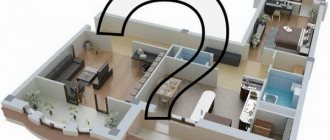It would seem that we live in the same country. And all Russians should have the same living conditions, plus or minus. But in practice it turns out differently for some reason.
We will not say anything about the spread of wages - it all depends on the number of large enterprises in the region and the shortage of workers: residents of either the center or the industrial north of the country benefit. Product prices in the regions are adjusted not only to logistical difficulties, but also to average salaries. But here's a communal apartment! The utility service does not depend on all this.
Tariffs are different everywhere
What does it depend on then?
Each region is free to set tariffs for utility services independently, but within the framework specified by law. For example, the Federal Tariff Service sets the maximum permissible tariff growth index for the year. And the cost of one cubic meter or kilowatt of the required resource depends on both climatic conditions and the wear and tear of the system. For example, delivering water through rotten pipes will bring a lot of losses to the water utility, and a lot of effort and money will be spent on frequent patching of holes and cracks. We decided to compare how big the difference is in utility bills in different parts of our vast country. To make it easier to compare the indicators, we compared them with average salaries in the region. For analysis, we selected 12 cities with a population of over 500 thousand people. Our two capitals were not ignored, and both the south of the country and the north (and also the east and west) were compared.
It is worth mentioning here that the prices indicated are on average, since within the same city there can (and usually operate) several providers of utility services, and each has its own tariffs.
In addition, some difficulties arose with the prices of hot water
: in some regions, the water tariff is set per cubic meter, and in others - per gigacalorie (unit of energy required to heat a cubic meter of water), so the price per cubic meter varies depending on the number of floors of the house, the thickness and material of the walls.
The same thing is happening with heating
- although they are always calculated by gigacalories, the number of gigacalories needed varies depending on the climate (in cold latitudes it will take more energy to heat one cubic meter of cold water than in warm latitudes), and in general in the north the heating season lasts longer than in south, and the cost of utilities ends up being higher.
How much do they pay for utilities?
Payments for residential accommodation and utilities are trending upward.
These country statistics apply to all regions. When calculating, the price for using living space is calculated based on the number of square meters. Utilities) are estimated by summing up the cost of cold and hot water, heat, gas, and other amenities. In large cities, rent rates are much higher than for the same area in small towns.
The average monthly cost of living in a three-room apartment for 2021 reached 6.5 thousand rubles. In the winter season it is at its maximum.
Residents' payment obligations
The rent, including utility bills, is finally established under an agreement with the HOA (Home Owners Association) or management company. For the calculation, the legislator's tariffs are applied, related to square meters of a specific area. Residents of houses in disrepair do not pay rent.
The law explains the term “rent” as follows: it is a sum of money transferred by citizens to housing and communal services enterprises (Housing and communal services) in the form of payments. Price includes:
- exploitation of living space;
- repair;
- payment of utilities.
Every tenant is required to pay for their accommodation, regardless of their source of income. This norm is specified in Art. 157 Housing Code of the Russian Federation (Housing Code of the Russian Federation). It also sets out the regulations on how payments are made and services are provided.
- In Art. 154 of the RF Housing Code describes the structure of payments.
- Art. 155 LCD - rules and terms by which payment is made.
- Art. 157 - methods of calculation using instruments, norms per person, how much you need to pay according to the fixed amount.
Some citizens, due to financial difficulties, cannot pay the amount every month before the 10th. Failure to do so on time will result in penalties. If there is a malicious attitude towards responsibilities and large debts, a person may lose the right to provide utility services.
Usually you are asked to pay the amount against a receipt that is delivered to your mailbox. The document contains complete information: tariff charges, prices, consumption standards, services provided. The law allows for partial payment of the amount indicated on the receipt form.
Rates
Tariffs for services and housing are set by local governments and state authorities. The standards from the legislation are taken as a basis. Regions can introduce their own tariffs for making payments by citizens. In some areas, social status is taken into account. There are benefits to help the poor and other categories in need:
- disabled people;
- minor orphans;
- pensioners;
- unemployed;
- persons with incomes less than 50% of the subsistence level.
Regulatory and legal acts are regulated by the Ministry of Construction and Housing and Communal Services. The same department sets tariffs based on average values.
Average rent
Looking around the country, you can see that rents vary greatly. If in one particular region citizens pay 2 thousand rubles for a one-room apartment, in another city residents pay 3,000 monthly.
About 17% of the family budget consists of rent and utilities. The average amount is derived from the calculation that in the winter season the charges are higher, which is associated with heating.
And also in the building of 5 floors there are no additional amenities: an elevator, a garbage chute, which are paid for by residents of nine-story buildings.
For example, it will be useful to find out what the rent is for a two-room apartment. Tariffs are approved by city governments. In 2021 they were increased. The average monthly cost of living is 3.7 thousand.
rubles per month for an apartment of about 50 sq. meters, two-room, if no more than two people are registered in it. How much citizens pay for electricity and some other needs is not included in the amount.
And for a one-room apartment (30 m2) it costs approximately 2 - 2.4 thousand rubles.
Tariff rules
The law establishes average tariffs for the country (for all types of buildings). So for a three-room living space they pay up to 5 thousand rubles. Amendments are made by regional authorities taking into account local conditions. For example, the city administration decided to charge 7.5 rubles per 1 meter of living space as the base rate. The material of the building walls is taken into account: brick. panel or wood.
According to the usual rule, the footage is summed up, taking into account the number of residents. Utilities are charged according to the readings of water, gas, electricity meters (metering devices). As a result of the calculation, citizens have different amounts that are not related to the average value.
Receipts are also often issued separately for each service. Garbage removal from the area near the house is calculated based on square footage, when a “kopeck piece” pays less than a “three ruble” in the same building.
The tariff for each meter is approved in an agreement with the Housing Office (Housing Maintenance Office).
An annual review of rents, consumption standards and tariffs with amendments to tariff plans is generally accepted. The housing office, by law, sends all residents a month before delivery of the receipt a written notification of changes.
What is included in payments
Article 425 of the Civil Code of the Russian Federation provides for rights and obligations in the provision and receipt of public services. Typically, the fee includes:
- specific characteristics of the living space;
- consumption of water (hot and cold), gas, electricity, heating;
- garbage removal;
- cleaning the area near the house;
- lighting of the adjacent space.
For example, thermal energy costs according to the tariff in the capital for 2019 from 1550 (until June) to 1600 rubles per Gcal (from July). Regions make adjustments to the rate. Electricity can be priced at 3.5 rubles per 1 kWh. The time of day is taken into account: during the day it is 3.55 rubles, and at night - 2.14 rubles per kWh. For rural areas, a coefficient has been introduced for these figures.
The rent is affected by the class of construction. Square meters in a townhouse cost 50 rubles per month each. If you buy a similar living space measuring 120 sq. meters in the “comfort” class, you will have to pay up to 15,000 rubles monthly.
When paying for “utilities” in accordance with the readings of the meters, which must be kept by citizens in order to avoid being charged at the maximum tariff, the readings are taken by a representative of the housing office.
Heating is calculated for each meter (for 1, 2, 3-room living space). Water and electricity - according to the number of living persons multiplied by the tariff. The gas rate (without a meter) is multiplied by the number of residents.
It does not matter which apartment is supplied with the resource: two-room, three-room or 1-5-room.
Subsidies
Both “utilities” and rent, with the observed constant increase in tariffs, are becoming unaffordable for some segments of the population. There is a social program to support the poor. When subsidies are provided, expenses are reimbursed. The rules are regulated by Government Decree No. 761 of 2005. The purpose of these measures is to resolve housing problems.
If a person’s income is less than the subsistence level, a coefficient is applied that reduces the maximum amount of housing payment. This figure is set differently for regions, taking into account factors:
- remoteness;
- local conditions;
- consumer basket.
The state assists citizens for whom rent becomes unaffordable relative to expenses. To apply for a subsidy, a citizen must visit the social protection office in his locality. If an individual (or citizens)’ housing and services associated with it amount to more than 22% of their income, such assistance is assigned.
Conclusion
With the annual increase in the cost of payment for accommodation and housing and communal services, the question of how this amount is calculated is relevant. It is known that large cities are somewhat “more expensive” in terms of rent. The price depends on the size of the area, the consumption of living resources according to metering devices is taken into account.
Finally, the number of registered persons is of great importance. The specific features of the monthly calculation can be understood by familiarizing yourself with the relevant legislation governing these issues. It would be useful for every citizen to know regional standards, the application of the tariff schedule and the calculation procedure.
Confidence in your rights will allow you to control the situation.
Source: https://okommunalke.ru/oplata/skolko-platyat-za-kommunalnye-uslugi
Irkutsk phenomenon
It is remarkable that Irkutsk suddenly became the city with the cheapest utilities.
What do we know about Irkutsk? Irkutsk is Siberia, it’s more than 600 thousand people living quite crowded. The population density is 2252 people per square kilometer. It is a little freer than in Astrakhan, but much denser than in Volgograd.
But this is not the reason for the cheapness of communal services. Irkutsk is home to Irkutskenergo, Russia's largest energy company. It unites 3 hydroelectric power plants, thermal power plants, as well as coal mines and heating networks of the region. That is, it is the largest energy center in the country
. It is not surprising that electricity costs residents of Irkutsk on average 4 times cheaper than everyone else, and cold water costs half as much. And even for gas, residents of Irkutsk pay half as much as other Russians (there is a gas field in Irkutsk that is being developed by Gazprom Dobycha Irkutsk). And all this despite a fairly high average salary of the population - 41 thousand rubles.
What is included in payments
Article 425 of the Civil Code of the Russian Federation provides for rights and obligations in the provision and receipt of public services. Typically, the fee includes:
- specific characteristics of the living space;
- consumption of water (hot and cold), gas, electricity, heating;
- garbage removal;
- cleaning the area near the house;
- lighting of the adjacent space.
For example, thermal energy costs according to the tariff in the capital for 2019 from 1550 (until June) to 1600 rubles per Gcal (from July). Regions make adjustments to the rate. Electricity can be priced at 3.5 rubles per 1 kWh. The time of day is taken into account: during the day it is 3.55 rubles, and at night - 2.14 rubles per kWh. For rural areas, a coefficient has been introduced for these figures.
The rent is affected by the class of construction. Square meters in a townhouse cost 50 rubles per month each. If you buy a similar living space measuring 120 sq. meters in the “comfort” class, you will have to pay up to 15,000 rubles monthly.
When paying for “utilities” in accordance with the readings of the meters, which must be kept by citizens in order to avoid being charged at the maximum tariff, the readings are taken by a representative of the housing office. Heating is calculated for each meter (for 1, 2, 3-room living space). Water and electricity - according to the number of living persons multiplied by the tariff. The gas rate (without a meter) is multiplied by the number of residents. It does not matter which apartment is supplied with the resource: two-room, three-room or 1-5-room.
Shoemakers with and without boots
But our hydroelectric power plants operate not only in Irkutsk. the Krasnoyarsk Hydroelectric Power Station,
operates in Krasnoyarsk (and the cost of a kilowatt of electricity there is 4 rubles 75 kopecks, which is comparable to prices in St. Petersburg).
the Volzhskaya Hydroelectric Power Station
near Volgograd (where a kilowatt costs 4 rubles 22 kopecks).
In the Samara region there is the Zhigulevskaya hydroelectric power station
(a kilowatt costs 4 rubles 6 kopecks). It turns out that for some reason the residents of Irkutsk enjoy the benefits of being close to a hydroelectric power station, but the rest - not so much.
What about our
gas
?
We also produce gas not only in Irkutsk. For example, there are gas fields in Astrakhan, Novosibirskneftegaz is operating in Novosibirsk (although, of course, more oil than gas), the volume of gas produced in Krasnoyarsk is growing. However, in none of these regions gas costs less than three rubles, as in Irkutsk. Moreover, in Krasnoyarsk blue fuel is one of the most expensive in the country
(6 rubles 27 kopecks) - it is more expensive only in Volgograd (8 rubles 97 kopecks), which is located only 300 kilometers from the Astrakhan gas condensate field.
With cold water
everything is also quite strange.
The cost of a cubic meter, as it turned out, does not depend either on the size of the city (in Novosibirsk, a millionth city, water is cheaper than in the small 500,000th Astrakhan), nor on the proximity of large water arteries (however, all Russian cities are located near one or another large river), nor from the average salary in the region (if we take into account the salaries of utility workers). What then does it depend on? But we don't know.
Hot water is easier - on average it is 6 times more expensive than cold water
, that's all.
And the prices for garbage
and completely demonstrate unity and equality. Throughout the country, garbage operators have united in a single impulse to charge 90 rubles per person per month. But we can argue endlessly about the quality of waste removal. At least judging by the reviews on social networks, residents of Kazan are satisfied with the cleanliness of their streets, but residents of Samara are not. But perhaps this is due to the excessive pickiness of some citizens, and not to objective problems with export (who are we to judge?).
Average rent for a two-room apartment in 2021
In large cities, the cost of using an apartment significantly exceeds the amount charged for housing of the same area in other localities.
For example, in Moscow, for living in a three-room apartment with a total area of 60 square meters, they pay from 2,000 to 3,000 rubles.
It should not be less than the size established by the utility.
But its final size is established under the terms of the agreement concluded with the HOA.
It is calculated taking into account the total area of the apartment and the tariff established by the legislator.
If the building is in disrepair, then rent is not paid.
Reflection in the law
Provisions of the articles of the Housing Code regarding payment of utility bills:
| Article 154 | board structure determination |
| Article 155 | establishing repayment rules, providing information on payment terms |
| Article 157 | fixing the value, calculation methodology using metering devices, including calculation rules according to the standards of consumption of services per person established by municipal authorities |
Receipt form
It contains complete information about the payments due, including utility charges.
The receipt form is divided into two parts, the first indicates payments for the consumption of water, light, heating and gas according to meter readings.
The second lists the amounts payable, accrued using common house meters, for heating the entrance to the building and lighting it at night.
The receipt form contains information about the consumption rate of each service and its cost.
In some regions, individual tariffs are provided depending on the social class of citizens.
The state provides benefits to help low-income people, pensioners, disabled people, and orphans.
The average size
16.6% of a family’s total income goes to paying rent and utilities, which amounts to an average of 5,500 rubles.
The specified amount is paid for living in a two-room apartment in winter, located in a five-story brick building without an elevator and parking with 50% wear and tear.
The Moscow city government approved the tariffs in its resolution.
They increased by 7.4% compared to last year.
The average rent for a two-room apartment in Moscow, the area of which is 52 square meters, will be about 3,700 rubles without payment for electricity supply, if two people are registered in it.
Existing tariffs
The average payment throughout the Federation for a three-room apartment is from 3,000 to 4,000 rubles.
Local regional executive authorities make adjustments depending on specific conditions.
For example, in the city of Cheboksary the base rate of payment per 1 square meter of total living space per month is set at 7.50 rubles.
It was established on the basis of a resolution of the Cheboksary city administration for the use of residential premises for persons living in residential buildings with different wall materials.
Payment for utility services is determined by the indicators of the meter.
For example, the service for removing garbage from the local area depends on the square footage of the living space.
The tariff per square meter is set according to the terms of the agreement concluded with the housing office.
Citizens pay on average from 2,000 to 3,000 rubles for a one-room apartment with an area of 30 square meters, depending on the region of residence. For example, in the Moscow region the average fee is 2,400 rubles.
What is included?
It consists of:
| Accommodation | on a certain living area |
| Electricity consumption | cold and hot water, gas, central heating |
| Removal of solid waste and garbage | maintenance of a residential building, including major repairs |
| Cleaning the local area | internal yard roads |
| Organization of area lighting | which is located along the perimeter of the building |
The national average tariff for thermal energy as of July 1 of this year is 1,400.00 rubles per gcal.
The cost of consumed electricity is 3.5 rubles.
In this case, the daytime tariff is 3.55 rubles per kWh, the night tariff is 2.14 rubles per kWh.
If there are meters
: Housing and communal services advice - how to transfer meter readings if you change the management company
According to the instructions of Government Resolution No. 307, published on May 23, 2006, fees are charged in proportion to the consumption standards of the service source:
| Heating | as the product of the area of living space and the thermal energy tariff per 1 square meter |
| Water and electricity | depends on the number of residents. The number of residents is multiplied by the tariff of the corresponding resource |
| Gas supply | by summing up individual indicators, for example, as the product of the number of occupants and food preparation standards |
Registration of a subsidy
The maximum amount of rent for renting residential premises is reduced by introducing an adjustment factor into the calculations if the average per capita income of citizens is below the subsistence level.
It is different for each region.
Attention!
- Due to frequent changes in legislation, information sometimes becomes outdated faster than we can update it on the website.
- All cases are very individual and depend on many factors. Basic information does not guarantee a solution to your specific problems.
That's why FREE expert consultants work for you around the clock!
APPLICATIONS AND CALLS ARE ACCEPTED 24/7 and 7 days a week.
Source: https://domdomoff.ru/srednjaja-kvartplata-za-dvuhkomnatnuju-kvartiru.html
Samara salaries lost to tariffs
At the same time, if we generally compare the cost of a communal apartment with the average salary, it seems that the residents of Samara are in a worse situation. The salary is the lowest, and the utilities are one of the highest.
And of the other regions, perhaps, except for Irkutsk, Muscovites are in the best position. But not due to cheap utilities, but due to high salaries, which level out its cost. However, if you live in Moscow and receive a salary below average, you can only sympathize with you. And probably advise you to move to Irkutsk.
How much money does it cost you to pay for utilities?
Residents' payment obligations
The rent, including utility bills, is finally established under an agreement with the HOA (Home Owners Association) or management company. For the calculation, the legislator's tariffs are applied, related to square meters of a specific area. Residents of houses in disrepair do not pay rent.
The law explains the term “rent” as follows: it is a sum of money transferred by citizens to housing and communal services enterprises (Housing and communal services) in the form of payments. Price includes:
- exploitation of living space;
- repair;
- payment of utilities.
Every tenant is required to pay for their accommodation, regardless of their source of income. This norm is specified in Art. 157 Housing Code of the Russian Federation (Housing Code of the Russian Federation). It also sets out the regulations on how payments are made and services are provided.
- In Art. 154 of the RF Housing Code describes the structure of payments.
- Art. 155 LCD - rules and terms by which payment is made.
- Art. 157 - methods of calculation using instruments, norms per person, how much you need to pay according to the fixed amount.
Some citizens, due to financial difficulties, cannot pay the amount every month before the 10th. Failure to do so on time will result in penalties. If there is a malicious attitude towards responsibilities and large debts, a person may lose the right to provide utility services.
Usually you are asked to pay the amount against a receipt that is delivered to your mailbox. The document contains complete information: tariff charges, prices, consumption standards, services provided. The law allows for partial payment of the amount indicated on the receipt form.









